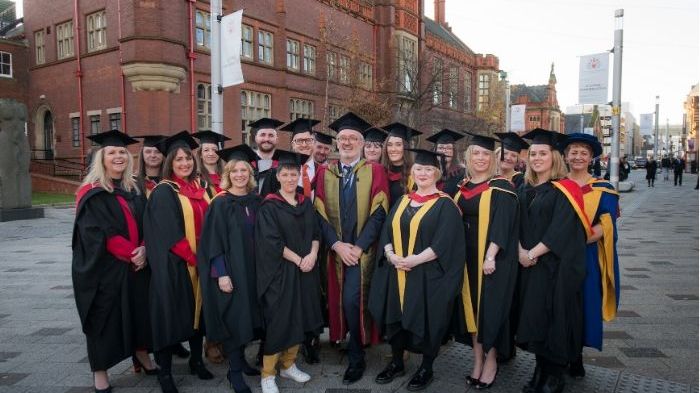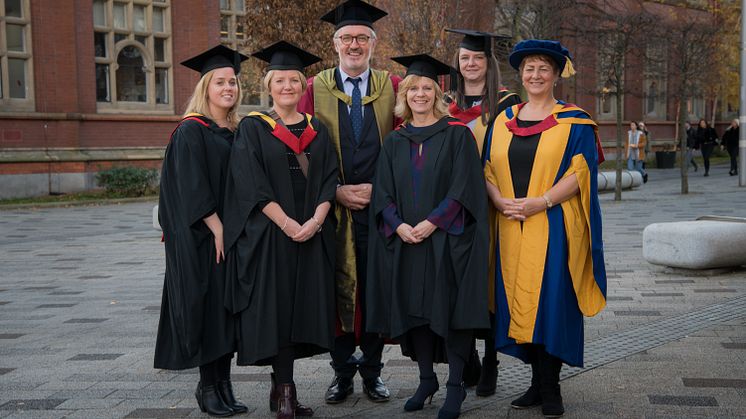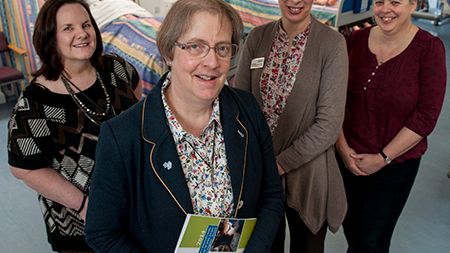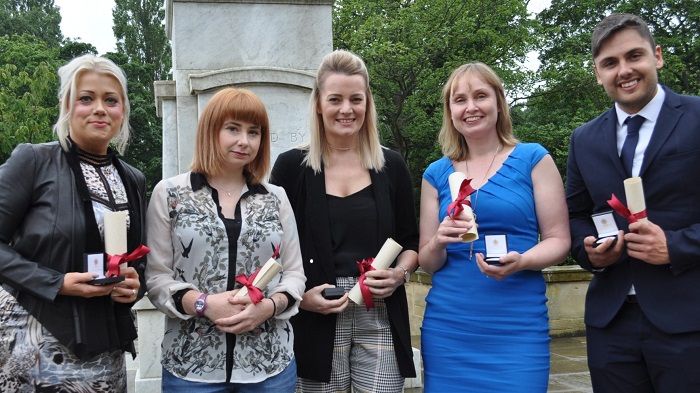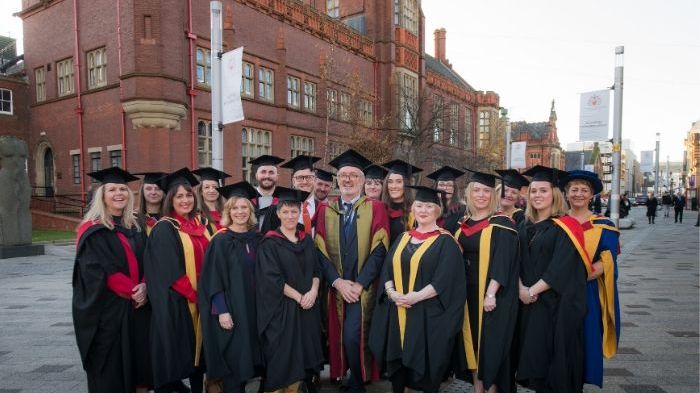
Press release -
Transforming care through workforce development
Northumbria University’s first cohort of students to study on the Transforming Care-commissioned Positive Behavioural Support programmes have graduated.
Positive Behavioural Support (PBS) is an evidence-based approach which is recognised as best practice in supporting people with learning disabilities and behaviours that challenge.
Through assessing the wider social, physical and individual contexts in which such behaviour occurs, it aims to facilitate the understanding of behaviour in order to develop support.
The overall goal is to improve a person’s quality of life and the lives of people around them and minimise the chances of behaviour that challenges happening in the first place.
Due to a lack of guidance about how best to support people to learn about the PBS approach and no nationally-agreed standards about the training requirements or qualifications and experience individuals or services need to have, the North East and North Cumbria Transforming Care Partnerships workforce group commissioned Northumbria University to co-develop, validate, co-deliver and evaluate a range of accredited learning programmes in Positive Behavioural Support for the North East and North Cumbria.
The project was initiated as part of the Department of Health and Social Care’s national Transforming Care programme, which aims to improve the lives of children, young people and adults with a learning disability and/or autism who display behaviours that challenge, including those with a mental health condition.
Northumbria University, NHS England North East and North Cumbria and the North East and Cumbria Learning Disability Network, worked together to adopt a system-wide workforce development approach which focuses on the education of individuals, and developing infrastructure in organisations for positive behavioural support to be enabled in practice.
As such, the positive behavioural support approach will become a way of life across health, social and education care in the North East and Cumbria.
It also aims to reduce the need of inpatient care by upskilling the existing health, social and education workforce in adopting this approach and enable improved support for people with learning disabilities and their families.
Dr Anne McNall, former PBS programmes Project Lead and Associate Professor at Northumbria University, led the scoping exercise to understand need and the innovative workforce development approach used in this project: “Purely training staff in a particular approach is often ineffective and does not lead to sustainable change as it does not address organisational and other barriers to implementing new practice; this requires whole system change such as cultural shift, the development of new policies, practices, ongoing supervision and support for staff to work in new ways.
“The development of innovative regional PBS workforce development manager posts working in partnership with the University supported staff to develop not only new knowledge, but apply their learning in practice and receive regular support to lead change in their organisations and staff teams.”
The University developed different levels of PBS learning programmes to reflect the fact that PBS is often provided by a variety of people with a range of competencies.
The first cohort of 32 graduates studied on the Level 6 or Level 7 programme, meaning they have gained an Advanced Diploma or Post Graduate Certificate respectively. PBS learning programmes at this level are intended for those Practice Leaders who are responsible for leading and supporting organisations to use PBS, with other programmes available at level 4 for practice facilitators who lead teams, support workers and family carers.
Following an interim evaluation, it is reported that the programmes have resulted in a range of positive impacts at individual, team, organisational and system-wide levels. These include positive changes for those being supported in terms of better and more consistent support, reduced behaviours that challenge and increased quality of life. Better engagement and relationships with families have also been reported.
Judith Thompson, Network Manager and Assurance Lead for the North East and Cumbria Leaning Disability Network, said: “I am immensely proud of the graduates. Developing and delivering this post graduate course is testament to what can be achieved when organisations work collaboratively that ultimately positively impacts on quality of life for people with learning disability.
“The Learning Disability Workforce Development Managers have played a huge role in providing work-based supervision and support in addition to delivering the university based programmes for each of the graduates hugely influencing organisational change.”
The nine-month-long Level 6 and Level 7 programmes have been delivered through blended learning. This involves a combination of University-based induction time, e-learning, locally delivered workshops, alongside guided study, practice-based learning and supervision with academic and competency assessments.
Graduates from the programmes are employed by a variety of 27 different social care service providers, ranging from national, widely recognised charities such as Mencap through to smaller, family-run organisations including Gateshead-based Ashdown Care.
Speaking about the PBS programme, Level 7 graduate and founder of Resolve Care in County Durham, Anne Graham, said: “PBS mirrors what we do in our homes and the course has really helped make the knowledge transfer more fluid. The resources were great and helped us to put theory into practice so that PBS flows right through our organisation.”
Fiona Kelly, Mencap Area Operations Manager for Redcar and Cleveland, said: “The course was truly transformative. We thought we knew a lot about PBS, but we learnt so much more, all of which is completely translatable to the workplace. We have already noticed the difference what we have learnt is making within the organisation.”
Operations Manager and PBS Practitioner at Positive Support for You, Sue Paton, commented: “This course was the most practice enhancing academic course I have ever experienced. Fantastic, hard work, bereft there was not a further year of study!”
Nicole Bruce, Therapeutic Services Manager at Careline Lifestyles, added: “The PBS programmes bring people together in roles that can be quite isolating. It’s great to study alongside a peer group who have the same vision of being dedicated to improving quality of life.”
Senior Operational Manager at West House, Cumbria, Alan Scott, said: “PBS encourages a commitment to cultural change and reduced restrictive practice. We see every minute as an opportunity to focus on improving quality of life. Through implementing the principles of PBS, one of our patients who previously required 3-1 support, is now able to live independently with assistive technology.”
Jill Chaplin, Consultant Psychological Therapist at Cumbria, Northumberland, Tyne and Wear NHS Foundation Trust, said: “We are proud to have been closely involved in the development of this innovative programme. The courses are being independently evaluated, and early analysis suggests a really positive impact on staff’s competencies and confidence. We are looking forward to working with the University and colleagues from Tees, Esk and Wear Valley NHS Foundation Trust during 2020, when the level 7/6 courses will be made available to some of our staff working in specialist community teams. This is the next exciting step in promoting the systemic change needed to improve the lives of people with learning disabilities and their families.”
Northumbria University offers a wide range of accredited and non-accredited short courses, specialist training and Continuing Professional Development (CPD) programmes that are based on the ground-breaking research of its academic experts. Courses can be delivered locally, nationally and internationally, for individuals or employers with single or multiple learners. For employers with group requirements Northumbria can collaborate with organisations to provide on-site customised CPD programmes, tailored to meet specific needs.
Those interested in finding out more about working with Northumbria should visit Northumbria.ac.uk/cpd
Topics
About Northumbria University
- Northumbria University, Newcastle is a research-rich, business-focused, professional university with a global reputation for academic excellence. To find out more about our courses go to www.northumbria.ac.uk
- Northumbria is one of the largest universities in the UK with more than 30,000 students from over 130 countries
- If you have a media enquiry please contact our Media and Communications team at media.communications@northumbria.ac.uk or call 0191 227 4604.
About the PBS Programmes at Northumbria University
- Dr Norman McClelland, Senior Lecturer in the department of Nursing, Midwifery and Health at Northumbria University, is the current Project Lead for the PBS programmes.
- Dr Stephen Noone, Senior Lecturer in the department of Nursing, Midwifery and Health at Northumbria University, has played a key role in the development of the PBS programmes as a subject specialist. Dr Noone leads the face-to-face teaching, while NHS Workforce Development Managers Alison Branch, Melissa Sherring and Lynne Jones offer direct, regular supervision to students.
- Stephen McStay, Senior Lecturer in the department of Nursing, Midwifery and Health at Northumbria University, is the PBS Programme Lead.
About the Transforming Care programme
- Following the Winterbourne View scandal, the Department of Health and Social Care signed an agreement to create a programme of action to transform services so that vulnerable people no longer live inappropriately in hospitals and are cared for in line with best practice.
- The Transforming Care programme aims to improve the lives of children, young people and adults with a learning disability and/or autism who display behaviours that challenge, including those with a mental health condition.
- Through the development of Transforming Care, the North of England was identified as a fast-track region, an initiative which enabled local leaders to start making changes quickly.
- The North East and North Cumbria Transforming Care Partnerships workforce group was established and it agreed to adopt the principles of PBS throughout health and social care, establishing a number of projects, including the commissioning of regional PBS leadership education programmes in collaboration with Northumbria University.







